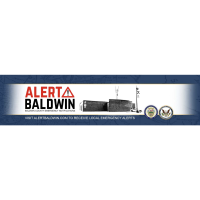Hurricane Helene Volunteer and Donations – How to Help
There is a great outpouring of support from individuals, businesses, and organizations throughout the country to help those affected by Hurricane Helene across the Southeast.
Donations and volunteers can be extremely helpful after a disaster, and meet the needs of the victims, the Voluntary Organizations Active in Disaster (VOADs), non-profits, community and faith-based organizations, and the government officials involved in the response. Unfortunately, donated goods and volunteers that are not specifically necessary can cause more confusion and hurt relief efforts. Coordinating donated money, goods, and volunteer efforts after a disaster ensures that survivors get help effectively and efficiently.
Alabamians can help those in need by donating and volunteering responsibly. These donation and volunteer tips apply to disaster relief efforts within Alabama, across the country, and internationally.
Volunteer, Donation Resources for Affected Southeast States
- American Red Cross: www.redcross.org
- Salvation Army: www.disaster.salvationarmyusa.org
Florida
- Donate or Volunteer: www.volunteerflorida.org
- Florida Disaster Fund: https://www.volunteerflorida.org/donatefdf/
Georgia
- Individual Volunteer Survey: Individuals wishing to volunteer in recovery efforts: https://forms.office.com/g/wu90BNWPhh
- Donations Survey: For organizations and agencies that are interested in providing in-kind donations: https://forms.office.com/g/fih30v8WGV
- Partnerships Update - https://forms.office.com/g/UHu4h0dStD
- Feeding Survey - https://forms.office.com/g/PVpLaG6D8d
North Carolina
- Donate or Volunteer: NCvoad.org
- North Carolina Disaster Relief Fund - ////nc.gov/donate
- Visit ReadyNC.org for state information
South Carolina
- Volunteer or Donate: https://scemd.org/recover/volunteer-and-donate/
Tennessee
- Volunteer, Donation and Resources: https://www.tn.gov/tema/updates/hurricane-helene
- Call 1-800-TBI-FIND – to report a missing person in affected areas
Helpful tips for Donating:
Cash is best. The best way to help people after a disaster is to donate cash to a recognized disaster relief organization. Monetary donations allow charitable organizations the flexibility to purchase items that are needed most, and, unlike material donations, cash donations entail no transportation costs. Cash donations avoid the process of collecting, sorting, and transporting donated goods. Cash donations may be tax deductible.
Cash donations allow relief organizations to:
- fund response and recovery efforts
- get goods and services and
- give financial aid to survivors.
Do not send unsolicited goods. It is important that prior to collecting any relief items, donors should contact the receiving local or national relief organization to verify the need and to make necessary transportation arrangements. Failure to do this will result in personnel, time, space, and money being spent to process uncoordinated items and will further detract from the resources being available to provide direct support to those affected by the disaster.
- Donate goods that are specifically requested or needed by recognized organizations. Contact your chosen organization before starting to collect or donate.
- Make a food donation to a local food bank that may distribute food to those impacted by the disaster.
Helpful tips for Volunteering:
- Get involved with a disaster relief organization before a disaster happens. They can provide the necessary training to help when a disaster occurs.
- Don't self-deploy to a disaster zone. Local officials will give specific instructions about how to volunteer. You can also check with volunteer organizations to learn about opportunities to help.
- Be patient. Sometimes the need for volunteers is greater during the recovery period.
Voluntary Organizations Active in Disaster (VOAD) members and partners are assisting communities in need. They will serve these communities as long as necessary. For a list of organizations involved in disaster response in the affected areas, visit their websites. Visit the social media sites of disaster relief organizations for more information.
· Alabama - Alabama VOAD (alvoad.org)
· Florida - FLVOAD (wpengine.com)
· Georgia - Georgia VOAD (gavoad.org)
· North Carolina - North Carolina Voluntary Organizations Active in Disaster (ncvoad.org)
· South Carolina - ////SCemd.org/recover/volunteer-and-donate/
· Tennessee - Tennessee VOAD (tnvoad.org)
Other Information
Text. Don’t Call. Texting leaves lines open for emergencies.
Locating Loved Ones. Family and friends are encouraged to check social network sites for information about your loved ones. American Red Cross is helping find loved ones through their helpline 1-800-RED-CROSS or complete this form online: https://rdcrss.org/3TQPblL. If someone is missing a child related to this disaster or any other incident, they need to call 9-1-1 and then 1-800-THE-LOST to receive assistance from the National Center for Missing and Exploited Children.
Find Help Near You. 2-1-1 provides individuals with the latest information and essential community services. It is the most comprehensive source of information about local resources and services available in the country. Call 2-1-1 or (888) 421-1266. Call 7-1-1 if you are hearing-impaired and ask to be connected to 2-1-1 Connects Alabama. In Alabama visit: ////www.211connectsalabama.org/



